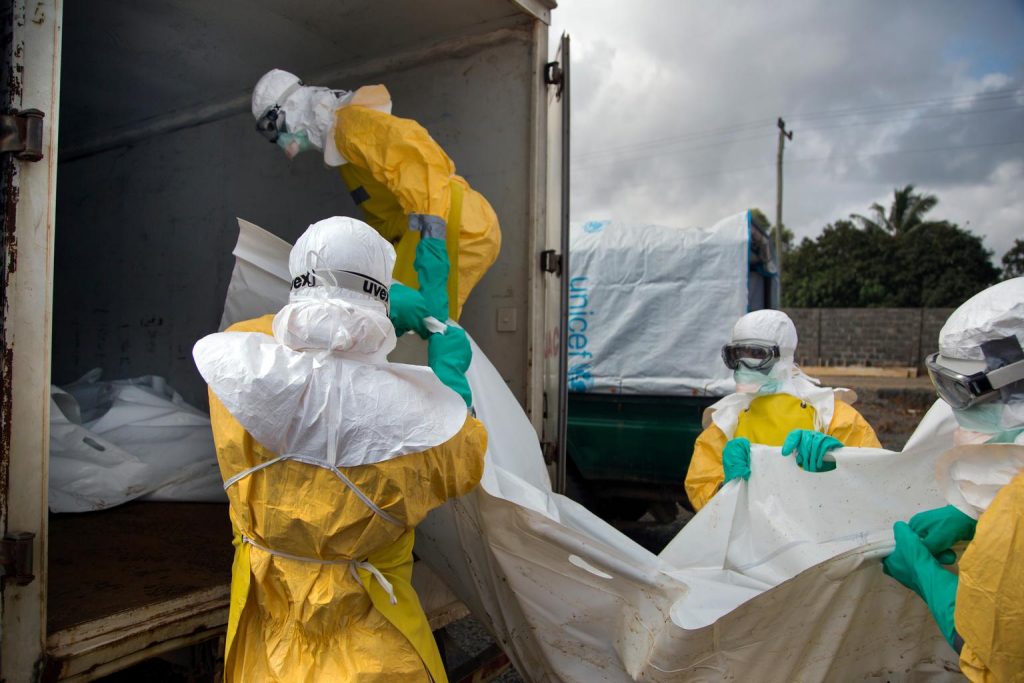Interviews were conducted with health workers and community members in Masindi, Uganda on improving the acceptability of infection control measures used during an Ebola outbreak. Measures that promote cultural sensitivity and transparency of control activities were preferred and should be employed in future control efforts. We suggest assessing the practicality of body bags with viewing windows, and face shields with or without chin protectors, in future outbreaks.
Background Reports
Infection Control During Filoviral Hemorrhagic Fever Outbreaks: Preferences of Community Members and Health Workers in Masindi, Uganda
Topics
HealthRegions
East and Southern AfricaCountries
UgandaRegional Hub
Central and East Africa HubRegional Hub Themes
Health, wellbeing and care
UNICEF/Kesner
On 3 September in Liberia, men dressed in head-to-toe personal protective equipment load bodies into a truck, outside an Ebola treatment centre in Monrovia, the capital.
The worst outbreak of Ebola virus disease (EVD) in history continues to ravage communities in West Africa. UNICEF estimates that 8.5 million children and young people under the age of 20 live in areas affected by EVD in Guinea, Sierra Leone and Liberia, countries where disease transmission is widespread and intense. Of these, 2.5 million are under the age of 5. Preliminary UNICEF estimates also indicate that at least 3,700 children in Guinea, Liberia and Sierra Leone have lost one or both parents to EVD since the start of the outbreak. Nigeria and Senegal are also affected, having experienced an initial case or cases, or localized transmission. UNICEF remains at the forefront of efforts to respond to and help curtail the outbreak. In Guinea, UNICEF has been distributing bars of soap, bottles of chlorine for handwashing and household water treatment, and flyers with information on EVD; preventative practices have also been shared through a door-to-door campaign supported by UNICEF and partners. In Liberia, UNICEFs partners, in co-ordination with the Ministry of Health and Social Welfare and the United States Agency for International Development (USAID), are distributing household protection kits in the hardest-hit areas. The kits contains critical supplies protective gowns, gloves and masks, as well as soap, chlorine and a sprayer, along with instructions on the use and safe disposal of materials that help family caregivers look after Ebola sufferers as safely as possible. From 1921 September in Sierra Leone, UNICEF supported a Government-led campaign to reach every household countrywide with life-saving messages on EVD. On 16 September, UNICEF appealed for over US$200 million to continue such responses to the outbreak. A proportion of the funds will also go toward helping neighbouri
Related content
Infographics
Key Considerations: Child Engagement in the Context of Disease Outbreaks in Eastern and Southern Africa
This infographic summarises the insights from a recent key considerations brief on child engagement in the context of disease outbreaks in Eastern and Southern Africa. This brief explores why, when and how to engage children in the prevention, response and…
Central and East Africa Hub
SSHAP
2024
Infographics
Key Considerations for Responding to Floods in South Sudan Through the Humanitarian-Peace-Development Nexus
This infographic summarises the insights from a recent key considerations brief on responding to floods in South Sudan through the lens of Humanitarian-Peace-Development (HDP) Nexus. The brief describes the multidimensional impacts of flooding on peace, health, livelihoods and governance and…
Central and East Africa Hub
SSHAP
2024
Briefing
Key Considerations: Child Engagement in the Context of Disease Outbreaks in Eastern and Southern Africa
Effective child engagement strategies are essential to optimise the response to disease outbreaks and minimise their impact while ensuring children’s protection, well-being and resilience. When children understand disease outbreaks, they are better able to cope, contribute and recover. This promotes…
Central and East Africa Hub
SSHAP
2024
Briefing
Key Considerations for Responding to Floods in South Sudan Through the Humanitarian-Peace-Development Nexus
In common with many other African countries, the Republic of South Sudan is increasingly experiencing devastating floods linked to climate change.1,2 The Indian Ocean Dipole (IOD) and El Niño regulate the climate of Equatorial Eastern Africa. In 2019, a dipole…
Central and East Africa Hub
SSHAP
2024


